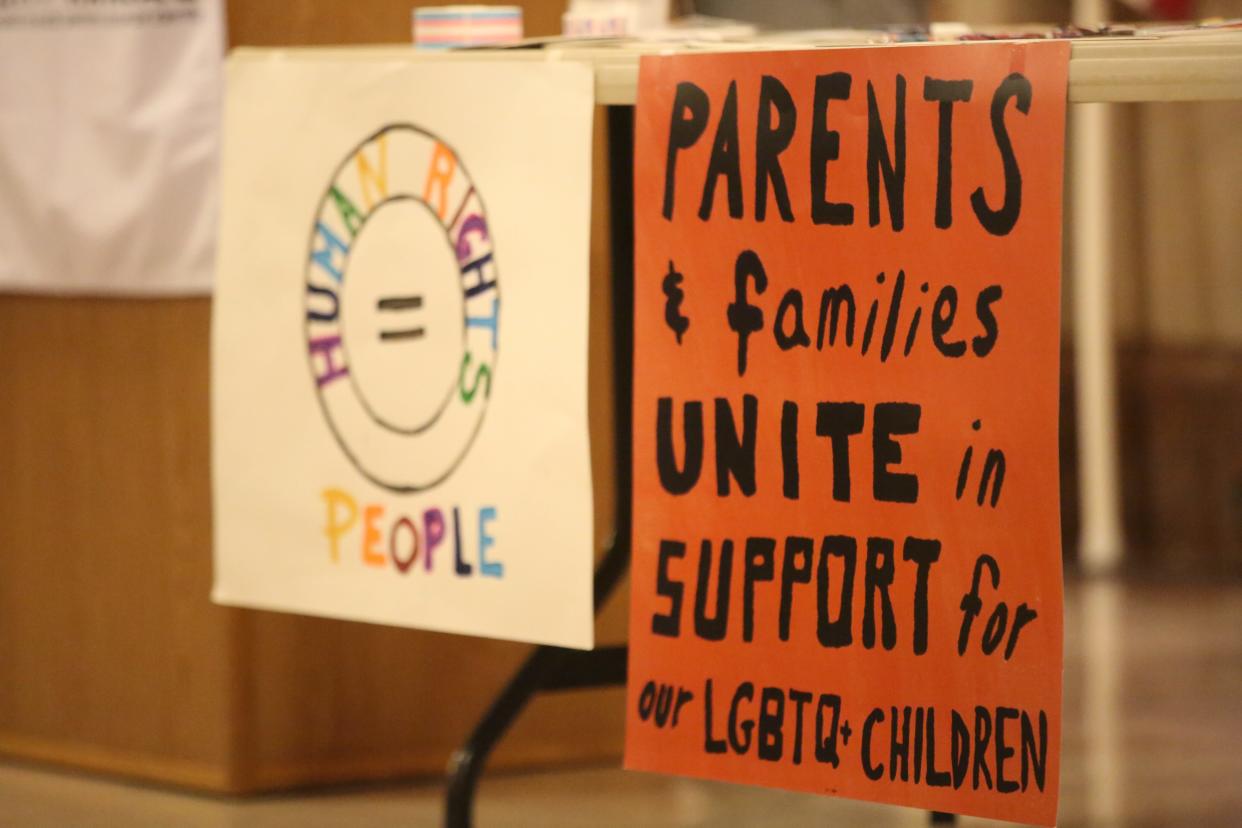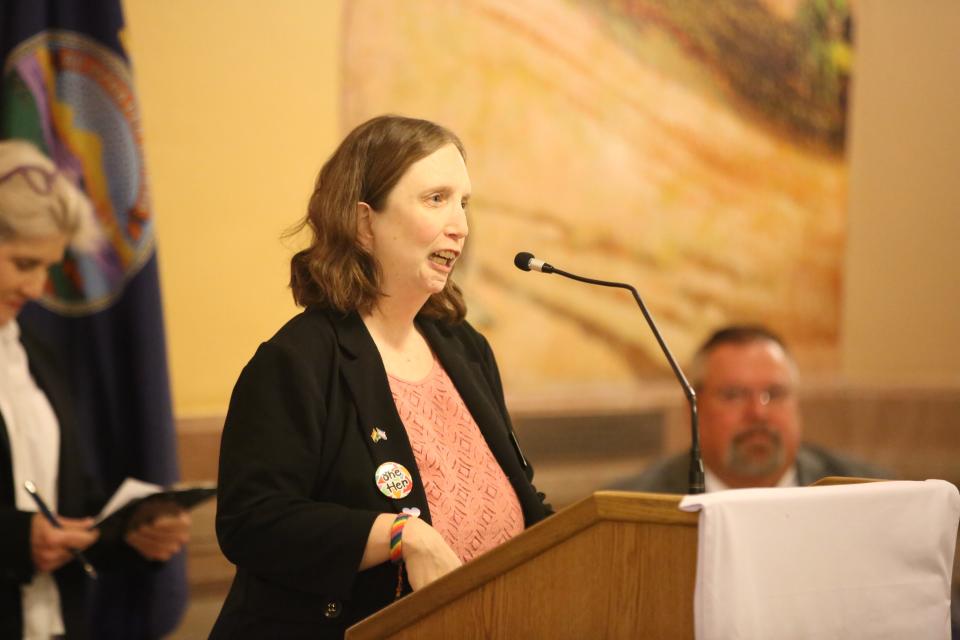Kansas advances bill requiring transgender people use bathroom in line with biological sex

Lawmakers advanced Wednesday a bill that would require transgender individuals use bathrooms, changing rooms and even prisons that align with their biological sex, a move that LGBT advocates say would erase trans Kansans.
Senate Bill 180 passed the Kansas House with sharp criticism despite an attempt by lawmakers to amend the bill's language to help individuals who fall outside of the male/female binary.
The bill passed with a path to a veto-proof majority in the House, with three Republicans voting no and Rep. Marvin Robinson, D-Kansas City, supporting the bill.
It fell one vote short of the two-thirds majority in the Senate originally and will now go to a team of negotiators from both chambers to sort out final language.
More:Kansas proposals to limit transgender athletes and health care advance in Legislature
The bill would define "woman" in state statute as a person who was deemed to be female at birth and it would require individuals use public facilities that mirror their biological sex.
It also would mandate government statisticians count individuals based on their biological sex and would prevent public documents, such as birth certificates, from being changed to reflect an individual's gender identity.
Proponents argue the language is necessary to protect women in public facilities and that it doesn't directly discuss transgender women, though critics counter this is merely a facade.
Changes to protect intersex residents don't bring opponents on board
The House Health and Human Services Committee altered the bill's language in a bid to acknowledge individuals who have disorders of sexual development, also known as intersex, meaning their reproductive or sexual anatomy does not fall neatly into male or female.
An individual, for instance, could have an abnormal number of sex chromosomes, are missing part or all of a sex chromosome, or have ambiguous or abnormal genitalia.
Under the bill, individuals who are intersex would be able to access legal protections under the Americans with Disabilities Act or similar state-level statutes.
Rep. John Eplee, R-Atchison, a physician, said the effort was to allow intersex individuals to be able to use facilities, saying that schools could maintain a gender-neutral bathroom or allow students to use a bathroom in a faculty lounge, for instance.
It was, he said, "just human dignity."
"Everyone has value and we should let everyone have an identity," he said. "Otherwise, we’re going to leave some people’s identity on the sidelines and it's not going to go well."
The amendment has been supported by Independent Women’s Voice, the group that has introduced similar legislation, dubbed the "Women's Bill of Rights," in other states.
May Mailman, a senior legal fellow at Independent Women's Voice, said in a statement that the bill's language never impacted intersex individuals but that the group supports the language "if it helps reassure the public."
"They are people with a medical condition, the exception that proves the scientific sex binary," Mailman said. "The Americans with Disabilities Act already requires reasonable accommodation of people with DSD conditions. The Women’s Bill of Rights never altered this in any way."
Rep. Susan Ruiz, D-Shawnee, took issue with the notion that intersex individuals had a disability.
"This bill assumes all people born intersex are disabled and this a very false assumption," she said.

And Taryn Jones, vice chair of Equality Kansas, said while it was notable that lawmakers were looking to be more inclusive towards intersex individuals, saying they have been "collateral damage" in the past.
But the bill still harmed transgender Kansans, she said.
"I feel like now that they have seen a bunch of testimony from people talking about intersex individuals, they kind of used that to say well maybe if we take thing out, people won't care and we can still discriminate," she said. "I feel it kind of pits two very marginalized people against each other."
Veto from Gov. Laura Kelly likely on legislation
But Rep. Brenda Landwehr, R-Wichita, echoed rhetoric from proponents that they believe sex is a fixed binary and that transgender rights activists are "redefining what is a woman."
Supporters have pointed to situations like that of Michelle Lamb, an inmate previously convicted of homicide, who received gender-affirming care and has been moved to Topeka Correctional Facility.
Randall Bowman, executive director of public affairs for the Kansas Department of Corrections, said Lamb was the only inmate transferred from a men's prison to the state's women's prison.
"We talk about rights," Landwehr said. "What is the rights of a woman? You are saying I have no more rights. I cannot go into a woman’s bathroom and know that a male will not walk into that bathroom. What about my rights? What about my comfort zone? What about my granddaughters, what about their rights."
Opponents argue the bill is harmful and does little to actually advance women's rights. They also say its provisions will increase bullying and harassment of LGBT residents, with research saying that sexual assault rates are higher for transgender individuals who use a bathroom that does not align with their gender identity.
"To some this bill may seem simple, but the impact will be far-reaching and insidious," said Rep. Lindsay Vaughn, D-Overland Park. "Trans people matter. Their existence is valid and attempting to metaphorically and literally erase them from state law is ignorant and harmful."
There also is concern that the bill's provisions will land the state in hot water legally.
In 2018, a group of transgender individuals and the Kansas Statewide Transgender Education Project sued the state over its policies preventing individuals from obtaining a birth certificate that reflects a gender identity different than one assigned at birth.
Reps. Mark Schreiber, R-Emporia, David Younger, R-Ulysses, and Jesse Borjon, R-Topeka, voted no on the bill, as did all Democrats from the Topeka area. All other Republicans from the Topeka area voted yes.
The state entered into a consent decree shortly after Gov. Laura Kelly took office agreeing to change its rules, but the bill would revert back to what is effectively the previous rules.
"It is likely to drag Kansas into needless litigation on a fact where the policy has already been found unconstitutional less than four years ago," said Ellen Berthels, an attorney with Kansas Legal Services who runs the Kansas Name Change Project.
Kelly has been sharply critical of the Legislature's focus on anti-transgender bills this session. Speaking at a rally Tuesday hosted by Equality Kansas, Kelly pledged to "veto any bill that aims to harm or discriminate against you," though she did not specifically address SB 180.
This article originally appeared on Topeka Capital-Journal: Kansas transgender bathroom bill advances, despite intersex change

